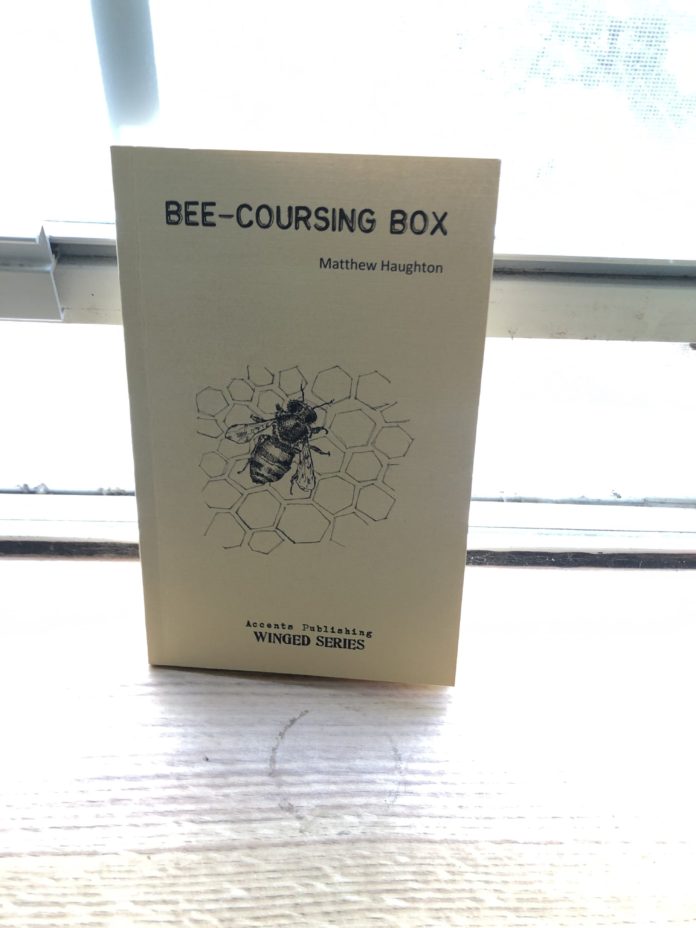Welcome to Lit Review, where columnist Dominiq Wilson will take apart a series of chapbooks to figure out what works and what doesn’t for the modern reader of poetry.
Bee-Coursing Box is Matthew Haughton’s debut poetry collection, published into Accents Publishing’s Winged Series. He currently lives in Lexington, as an artist and educator, but has lived in Colorado and eastern Kentucky, which I like to think influenced the poems in this collection.
Before the poems begin, Haughton provides instructions on how to create a bee-coursing box, which I thought was really cool! It turns out that the contraption covers bees in flour so it’s easier to see the bees while they fly, which is one of the many ways to find out where a bee’s hive is. When I first read it, it seemed a bit morbid to follow a bee to its hive and take the honey from it, but the first poem in the collection that mentions bee-coursing boxes created a different scene for me. If you would like, read the poem below:
Inside I find the shell of a honeybee,
down at the bottom of the box.
He’s thin as my fingernail,
buried in a cup’s worth of flour.
I closed my eyes and imagine
the spell lifts—
so this honeybee
can rise
like Snow White
From her apple-bitten sleep.
I follow him, coursing on the back
of his tiny wings
until he finds a hive up in a tree.
I mark the tree and return
year after year;
we grow old
together,
deep into his second life.
But there’s no magic;
his husk says
just as I found it,
the last taste of honey
becomes something
like a song
or memory
for his shapeless mouth.
The rest of the poems in the collection are obviously heavily influenced by nature, and for the most part, the life within it. The majority of the poems mention animals in some way, shape, or form, but the first few that dealt with plants included “Deer Tongue: A Conversation about Tobacco” and “Tracking Seeds,” a three-part poem in the collection.
“Deer Tongue” caught my eye in a strange way, considering I have strong negative feelings about tobacco, but I noted why it was so interesting: it describes the lighting of a cigarette in such an interesting way that I reread it a few times. I also found the mentioning of a deer tongue almost as foreshadowing to what tobacco can do to your body, but that could come from my negative bias.
“Tracking Seeds” piqued my interest in the same way that it describes a process. All three poems take a position within the cycle of a seed, from its first dismantle from a wilting plant, it’s travel through the air, and where it lands. These process perspectives are ones that I never thought about, and I find them to be very interesting.
One of the few poems that I really loved is “The Lover’s Knot,” which is a narration on a hiker finding two dead snakes that were knotted together. I relate to the narrator in the way that he seems to feel bad for these snakes and how he wishes them the best life in the afterlife. I strongly encourage you to read below.
Out walking, I found
two dead snakes
tied in a lover’s knot.
Slumped in the grass,
their skins shone
like beaded copper
while flies traveled
up their lengths.
I looked at the male,
tethered to his mate.
She lay beside him,
mouth gorged open.
I left them behind,
worried all lovers
could end this way —
in the open, without
keep or tending.
In the living wake of
things, I pray there’s
a heaven for snakes.
Their bodies coiling
round one another
in the high, cool grass.
Aside from the narrator in this poem, there isn’t much human interaction or domination with or over nature, but there is a separate series of poems at the end of the collection under the title of “Preacher Road.” This series of six poems are dedicated to the poet, minister, and activist Don West, and they tell of the road trip going down Preacher Road (or at least that’s what I assume). It starts out pretty well, and it gets increasingly eerie and strange. I won’t give away the ending, but I liked the series a lot and the ending even more.
I hope that some of you reach out to read this book! I was able to borrow the book from Professor Manning, but just like Plein Jeu, you can purchase this book on Accents Publishing’s website for $5. They are limited, so please email them to check on the book’s availability.



